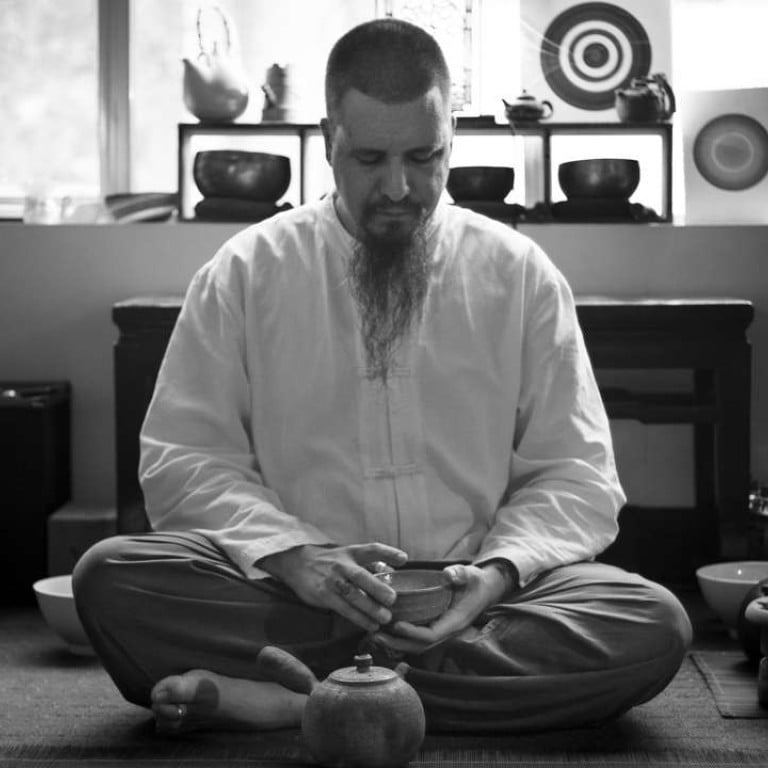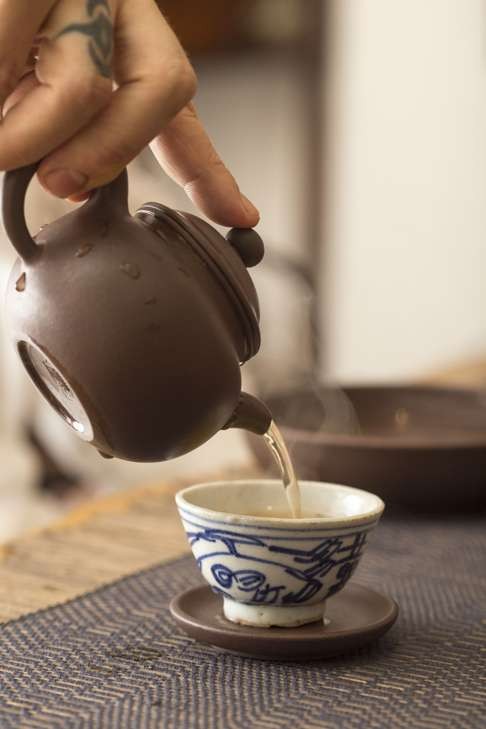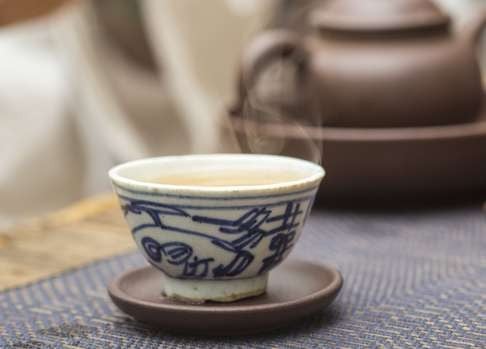
How a man from the Midwest became Wu De the tea master
Aaron Fisher from Ohio always had an interest in Asia, and left home as soon as he could to visit. On his travels he became fascinated with tea ceremonies, settled down and set up his own tea centre in Taiwan
Tea master Wu De lives in Taiwan where he teaches cha dao, the way of tea. Don’t be deceived by the name – he is a white American, born Aaron Fisher and raised in rural Ohio, but his interest in Asia began when he was very young. At the age of two he confounded his parents by asking Santa for a Chinese sister.
“I was a peculiar kid. People weren’t shocked by anything because I was just strange,” he says.
In those days most children’s toys were made in Taiwan, prompting him to look it up in an atlas. He saw it as “this little island ... with magic toy factories”.
Later he began practising martial arts and meditating at the beginning and end of each class. At university he studied anthropology and philosophy, got into Buddhist meditation and was intent on becoming a monk.
“I was celibate through college – that was hard. When there are pretty girls everywhere it’s not easy, but once I was in the mountains it was easier,” he says.
The time in the mountains was immediately after college. He was so keen to head to Asia that as soon as he graduated, without even waiting for his graduation ceremony, he headed to India where he lived and worked in a meditation centre for several years. He began preparing tea daily as part of his meditation practice.

It was in India that he met a Japanese Zen Buddhist monk who would have a huge influence on his life. He was trained in a tea tradition began passing on his knowledge. He went on to study kung fu tea under Lin Ping Xiang in Kuala Lumpur.
“The two teachers complemented each other – the Zen teacher’s approach was more ceremonial, Master Lin’s was one of mastery and skill,” he says.
The teachers were critical for his development, without them he would not have been able gain the insights and knowledge that he has about cha dao.
“There is a need for lineage. If I sat on an island and brewed tea by myself I couldn’t teach this level because what’s taught to me is thousands of years of wisdom,” he says.
From India he moved to Myanmar and then was invited by his Zen teacher to go to Japan where he was ordained in the Soto Zen tradition. When his master passed away he moved to Taiwan where he met the woman who would become his wife. He has been there more than 10 years, teaching the art of tea at his Tea Sage Hut.

“This modern separation of body, mind and spirit is absurd and not in accordance with ourselves. When we get a cold, that cold affects your spirit and mind as well as your body. And vice versa – trauma can influence the body,” he says.
The health benefits of drinking tea have long been proclaimed and Wu De traces the tradition back to the ancient Chinese myth about Shennong, who was also known as the “Divine Farmer” for his teachings on agriculture.
“The story is that he was meditating and boiling water and a tea leaf fell into the cauldron and he drank the first bowl of tea and exclaimed, ‘This is the emperor of all medicinal herbs’,” says Wu De.
He says that in the case of most medicinal herbs it is the toxicity of the plant that is the medicine so that if you have a stomach ailment and take those herbs they are good for you, but if you don’t have that ailment and take those herbs they will make you sick.
The beauty of tea is that it is an adaptogen (meaning it helps the body adapt, most notably to stress) and can be used every day because it is benign. “Tea has been used and consumed every day for 20,000 years – it’s older than the pyramids,” he says.
In Chinese medical theory there are three energies in the human body: jing, our vitality, the energy you dig into when you are exercising and need to go further, as well as sexual energy; qi, the movement of atoms, our breath, the flow of blood; and shen, cosmic energy, what connects us to heaven, the stars and those mysteries that are beyond us. Tea is thought of as a shen herb, a spiritual herb.
One of the first medical texts to discuss tea, says Wu De, stated that the purpose of tea was to brighten the eyes.
“There’s a lot of ways to understand that, but one way in traditional Chinese medicine is the idea that when the shen, the universal heaven energy, comes to rest in our heart then our eyes light up,” says Wu De, whose business card describes him as a “Student of the Leaf”.
He says that tea connects in three ways as a mindfulness practice, it connects us with nature, and it connects us with others.
As a mindfulness practice – taking the time to prepare and drink tea – it is non-sectarian and universal, people do it all over the world. Indeed, it is the second most consumed drink in the world after water.
If the aim of drinking tea is to cultivate mindfulness, Wu De recommends ensuring that the tea is produced in a way that is not harmful to nature and recommends drinking organic, sustainable tea.
“If you want to write a peaceful song it is hard if the first five bars are heavy metal, the music has already started in the wrong direction. Teas grown with agrochemicals are harmful to the earth and the farmers who produce them, that is never going to be good medicine,” he says.
As for connecting people with others, Wu De says the British worked that out for themselves, understanding that tea isn’t merely a medicine or a beverage, but a time to set down your work and be with people who you care about and have a meaningful connection.
“Tea is kindness, it’s a way of connecting to other people and that is very important to understand human health,” he says.
Wu De says every disease is either caused or complicated by stress; and having a peaceful life – including mindfulness practice and connecting to others – goes a long way towards preventing illness.
Wu De will lead a series of tea ceremonies from January 23 to February 1 at Como Shambhala Estate in Bali, serving tea in silence to allow participants to experience the deep serenity that can come from drinking tea, and explaining how to do it at home.
“Como has a spring on the property and every day we hike to the spring to get water and then take the water to an ancient Balinese temple to be blessed. The temple was already on the land when Como bought it and they made an agreement with the locals that they wouldn’t harm or move it,” he says. “A priest blesses us and the water and then we prepare the tea.”
Tea ceremonies with Wu De, Como Shambhala Estate, Bali, Indonesia, January 23 to February 1

